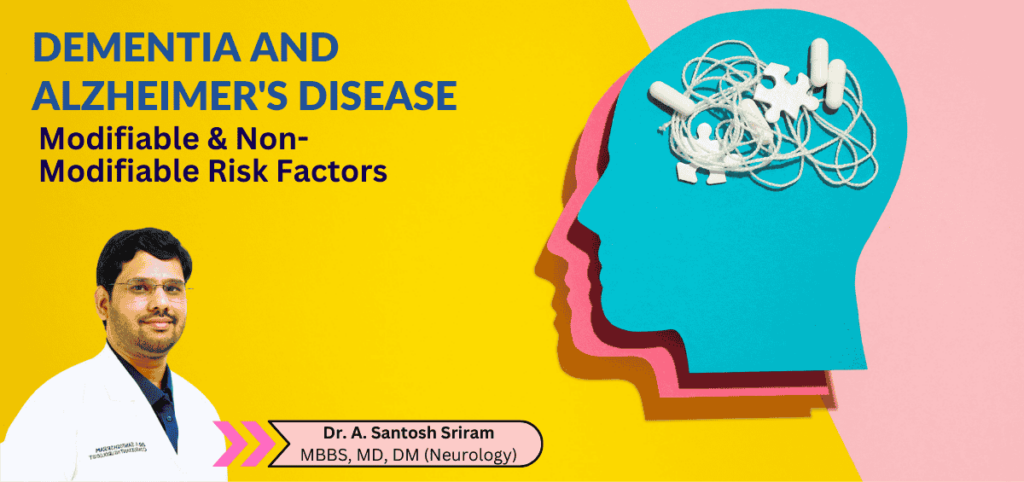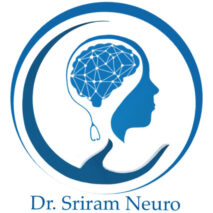
Know All About Modifiable & Non-Modifiable Risk Factors for Alzheimer’s Disease and Dementia
In this article, noted neurologist Dr A Santosh Sriram explores the primary risk factors for AD and dementia, focusing on age, genetics, and modifiable lifestyle factors. By understanding and addressing these risk factors, we can take proactive steps toward better brain health and cognitive longevity.
Alzheimer’s disease (AD) and other forms of dementia are among the most pressing health concerns of an aging population. While the exact causes of these conditions remain unclear, scientists have identified several key risk factors that contribute to the development and progression of AD. Understanding these factors can offer insights into potential preventive measures and interventions.
Non-Modifiable Risk Factor
Age:
Age is considered the leading non-modifiable risk factor for Alzheimer’s disease. According to Alzheimer’s Association Alzheimer’s Disease Facts and Figures, the risk of developing AD increases with age, with the majority of cases occurring in people over the age of 65.
This is due, in part, to the brain’s natural aging processes, including the accumulation of harmful plaques and tangles that disrupt neural function. While the exact mechanisms behind these changes are still being studied, factors such as a reduced ability to repair damaged cells, changes in sleep patterns, and cardiovascular issues may contribute to the gradual breakdown of cognitive function in older.
Genetics
Genetics and Family history are additional non-modifiable risk factors. Genetics plays a critical role in Alzheimer’s disease, with some individuals carrying specific genetic mutations that significantly increase their risk. Rare genetic conditions, such as mutations in the APP, PSEN1, or PSEN2 genes are known to trigger the onset of AD, often at a younger age. These mutations lead to the production of abnormal proteins that accumulate in the brain, contributing to the development of plaques and tangles.
Family History:
Having a family history of AD is known to be a non-modifiable risk factor. However, while genetics play a significant role in the risk of developing Alzheimer’s disease (AD), not everyone with a family history of the condition will develop it. Similarly, some individuals diagnosed with AD may not have any known family history of the disease.
👉 Did you know that an estimated 7.4% of individuals aged 60 and older in India are living with dementia? Learn more about it here.
Modifiable Risk Factors: Lifestyle Choices that Impact Cognitive Health
While age, genetics and family history are fixed, several modifiable risk factors can influence the development of AD and dementia. Addressing these factors may offer significant opportunities for prevention or delay of cognitive decline.
- Cardiovascular Health: Conditions such as diabetes, hypertension, and high LDL cholesterol are well-established risk factors for dementia. Cardiovascular health is closely linked to brain health because the brain requires a steady supply of oxygen and nutrients delivered through the blood vessels.
- Obesity: Obesity, particularly in midlife, is another risk factor for dementia. Excess weight can lead to insulin resistance, inflammation, and changes in brain function, all of which may contribute to AD.
- Traumatic Brain Injury (TBI): A history of traumatic brain injury, particularly with loss of consciousness, has been linked to an increased risk of dementia. Repeated head injuries, such as those sustained in contact sports or accidents, may cause long-term damage to the brain and increase the likelihood of developing AD
- Substance Use: Smoking and excessive alcohol consumption are both associated with an increased risk of dementia. Smoking can impair blood flow to the brain and increase the likelihood of oxidative damage, while alcohol abuse can lead to brain shrinkage and disrupt neurochemical balances
- Physical Inactivity: Physical inactivity is a known risk factor for cognitive decline. Regular exercise has been shown to improve brain health by increasing blood flow, reducing inflammation, and promoting the growth of new neural connections.
- Social Isolation: Similarly, social isolation and lack of engagement can accelerate cognitive decline, as social and intellectual stimulation are crucial for maintaining cognitive function.
Conclusion
Alzheimer’s disease and dementia are complex conditions influenced by a combination of genetic, lifestyle, and environmental factors. While we cannot change our age or genetic makeup, there are several modifiable risk factors—such as maintaining cardiovascular health, managing weight, staying physically active, avoiding substance abuse, and fostering social connections—that can help reduce the risk of cognitive decline.
Early intervention and lifestyle changes may help prevent or delay the onset of Alzheimer’s disease and other forms of dementia, allowing individuals to maintain a higher quality of life as they age.
Learn more about your AD & Dementia risk and protect your future by scheduling a consultation with Dr. A. Santosh Sriram for expert guidance and best treatment for dementia and Alzheimer’s disease in Hyderabad.
